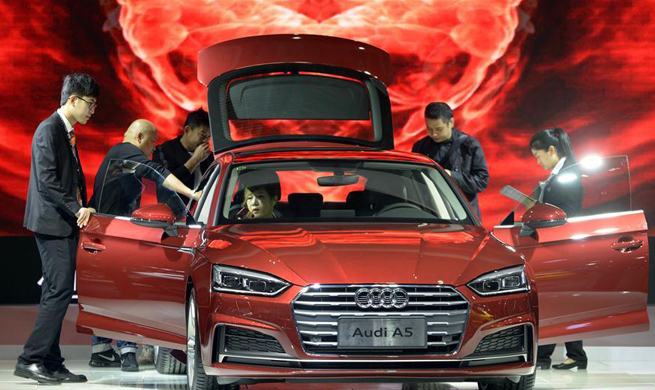By Mahmoud Darwesh, Naaima Misrati
TRIPOLI, Oct. 12 (Xinhua) -- Despite the increase in oil production to roughly 1 million barrels per day (bpd), Libya still suffers financial crisis triggered by the decline of oil export.
The oil production, which is the country's main source of income, began to decline due to years-long frequent armed attacks and clashes in oil fields and ports.
The daily oil production once plummeted from 1.6 million bpd before the 2011 uprising to about 250,000 bpd in 2014.
After the eastern-based Libyan army led by General Khalifa Haftar took over the four major oil ports and oil fields last year from armed groups, the export of oil resumed gradually.
However, the country's economy did not see much improvement, as the Central Bank announced recently a public revenue deficit of 4 billion U.S. dollars in the first nine months of 2017.
The bank attributed the deficit to the fall of revenues from oil, taxes and customs.
Earlier in July, the Central Bank predicted that this year's oil and gas revenues would not afford to pay the salaries of government employees with a deficit of 3.2 billion dollars.
In addition, Libyan residents live in poor condition as insecurity, frequent power blackouts, cuts of water supply, and shortage of funds in local banks repeatedly happen in the country.
Ali Mohamed, 30-year-old, who used to work as a quality assurance officer in a local soda factory, was laid off along with many of his then colleagues because the factory could not afford to pay his salary.
"Even now I work as an automobile technician for a living, I can barely provide basic necessities for my family," he said.
Frequent power blackouts occur on a regular basis in Libya, as power plants suffer a lack of maintenance because most foreign companies responsible for maintenance had to leave the country due to security concerns.
Power cuts sometimes last for as long as 12 hours a day in the capital, and for days in other cities. Residents have to use domestic power generators to fill in the electricity gap.
Power blackouts are usually followed by water cutoff in Tripoli, an issue that most residents solve by using external water tanks.
To make things worse, local currency became very weak leading to the skyrocketing prices of almost everything in the country.
Kidnapping for ransoms is ubiquitous in Libya. "My 21-year-old brother was kidnapped by an armed gang in Tripoli a few months ago. We had to pay thousands of dinars for ransom to have him released. We are lucky they did not kill him," said Mohamed Abussalam, an electrician in Tripoli.
Life in the capital almost disappears at night, as residents remain at home due to the rise of crimes.
Experts said that the economy's dependence on oil export and failure to find alternative revenues are major reasons behind the current economic difficulties.
"Libya's economy is absolutely dependent on oil export. After gunmen closed the four largest oil ports - Sidra, Ras Lanuf, Brega and Zwitina - for three full years, oil export decreased drastically. This led to the subsequent economic crisis," Faraj Mnesi, an expert on Libyan economic and financial issues, told Xinhua.
Awad Abdel-Ali, a Libyan professor of economics, said the increase of the oil production could not save the economy, as the government lacked administrative solutions
The Libyan government expected tax revenues to reach 600 million dinars (374 million dollars) in the first nine months of 2017, while the actual revenues amounted to 493 million dinars. Expected customs revenues were 187 million dinars, while the actual revenues were only 82 million dinars.
"This means that the country was incapable of collecting taxes and customs which could be an alternative income to oil," Abdel-Ali explained.
"Libya provides electricity and water to its people for free. This adds another financial burden on the state, as the country, instead of people, pays companies for these services. Libyan banks also do not carry out commercial or investment activities. The state is also compensating for the loss that the banks cause," Abdel-Ali added.
"The solution is to create new ways to finance the public budget, and not to rely entirely on oil export," Abdel-Ali said.
Libya's Deputy Prime Minister Ahmed Maetig said in Berlin in August that Libya would not be able to overcome the challenges it currently faces unless it revives the economy and stimulates job creation.
"It is important to develop small and medium enterprises, the private sector and to reactivate infrastructure projects. These are crucial to rebuilding a functioning Libyan state," he said.















